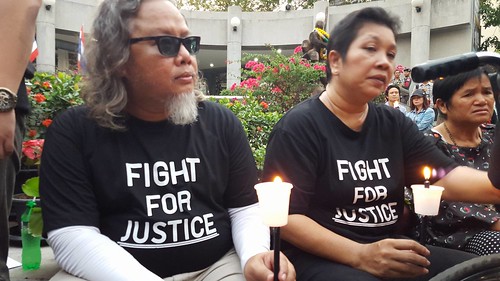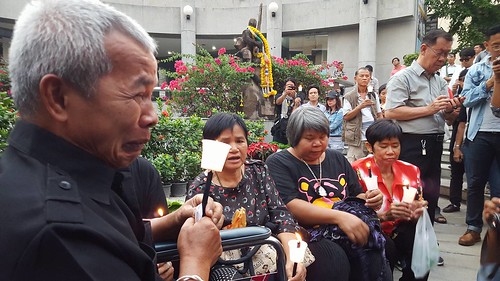Families of the victims of the military crackdown on the anti-establishment red-shirt protesters during the political violence in April-May 2010 have vowed to struggle for justice, branding as ‘shameful’ the recent ruling not prosecute those who authorised the crackdown.
At 7 pm on Wednesday, 6 December 2016, Payao Akhad, mother of Kamolkate Akhad, a medic who was killed on 19 May 2010 at Wat Pathum Wanaram Temple in central Bangkok during the military crackdown on the red-shirt protesters, Nattapat Akhad, her son, Pansak Srithep, a pro-democracy activist whose son was killed by the military during the same political violence, and Wannakiet Chusuwan, a pro-democracy activist, gathered at the 14 October Memorial on Ratchadamnoen Road, Bangkok.
The four were joined by members of the families of other victims of the April-May 2010 political violence as some of them read out statements to condemn the judicial process, which has failed to bring to justice those responsible for the military crackdown on demonstrators of the United Front for Democracy Against Dictatorship (UDD), the main red-shirt faction, which resulted in at least 90 deaths and 2,000 injured.
Despite the risk of being charged for violating the junta’s ban on political gatherings, the four and others decided to come out after the Office of the National Anti-Corruption Commission (NACC) in late December 2015 announced that it had reached a resolution to withdraw allegations against Abhisit Vejjajiva, former Democrat Party Prime Minister, Suthep Thaugsuban, his former Deputy, and Gen Anupong Paochinda, the former Army Chief, who were accused of malfeasance for ordering military and police officers to reclaim several venues in Bangkok city centre from red-shirt demonstrators in April and May 2010.
“We will not accept the shame of the National Anti-Corruption Commission (NACC). I tell you, from this day onwards, I will begin a struggle again after a long halt. You (NACC) have caused me to rise up to fight again. I will do everything I can to make society realise what you did to the dead and those who were injured. You [the authorities] have been slandering us for so long. It is now the time when I will not give in,” said Payao.

Pansak Srithep (left) and Payao Akhad (right) light candles at the 14 October Memorial on 6 January 2016 to mourn their children who were killed during the military crackdown on red-shirt demonstrators in 2010
Another participant in the event, Phasuk Ngamkam, a red shirt who participated in the demonstrations in 2010, said “If I was a human who witnessed other human beings dying like pigs and dogs and did nothing, I would think I’m lower than dogs. Therefore, I will fight with their families.”
Payao added that the court has ruled that six of the victims who were killed in Wat Pathum Wanaram Temple in central Bangkok during the 2010 political violence were killed by state security officers, but the NACC decided to dismiss charges against the three who authorised the crackdown.
According to Wannakiet, before stating its conclusion after a 6-year-inquiry into the April-May 2010 political violence, the NACC only called on Abhisit, Suthep, and Gen Anupong, to testify as witnesses to the incident, but no members of the victims’ families were called in.
In a two-page report released on 29 December 2015, the NACC concluded that the 2010 red-shirt protest was not peaceful and that there were armed militants among the demonstrators. Therefore, the Centre for the Resolution of the Emergency Situation (CRES), an agency formed to handle the 2010 red-shirt protesters with Suthep as Director, had to authorise armed personnel to reclaim the demonstration venues in Bangkok.
Although the military and police officers had to carry arms to protect themselves during the crackdown in accordance with ‘international standards’, if it is proven later that the officers used weapons ‘unnecessarily’ which resulted in the deaths of demonstrators, the officers and their commanders shall be charged on an ‘individual basis’.

An elderly man shed tears while mourning the victims of the 2010 military crackdown
The Department of Special Investigation (DSI) will carry out investigations of military officers who allegedly used weapons ‘unnecessarily’ which resulted in loss of life, NACC added.
As for the allegation that Abhisit, Suthep, and Gen Anupong did not reconsider and cancel the CRES order as it was causing a high death toll during the 2010 crackdown, the NACC dismissed the allegation and concluded that the three did resort to other measures between 14 and 19 May 2010 to install military checkpoints to encircle and prevent more red shirt protesters from entering the city centre and gave protesters notice before they reclaimed the areas.
In the six years since the April-May 2010 crackdown, the Criminal Court has ruled on 30 deaths in a total of 20 cases concerning those killed in the massacre. According to the rulings, 18 out of the 30 were killed by bullets coming from the military. These include Fabio Polenghi, an Italian photo-journalist, Kunakorn Srisuwan, a 13-year-old child, Pan Kamkong, a red-shirt taxi driver, and many others. However, none of the inquests specified the individual army officers responsible for the deaths.
“The failure of successive Thai governments to prosecute anyone from the military for the 2010 political violence sends a stark message of impunity,” said Brad Adams, Asia Director at Human Rights Watch. “Fully five years on, commanders who gave the orders to soldiers and those who pulled the triggers all remain untouchable.”
Human Rights Watch’s May 2011 report, “Descent into Chaos: Thailand’s 2010 Red Shirt Protests and the Government Crackdown,” documented excessive and unnecessary force by the military which caused many deaths and injuries during the 2010 political confrontations.
The high number of casualties – including unarmed demonstrators, volunteer medics and first responders, reporters, photographers, and bystanders – resulted in part from the enforcement of “live fire zones” around the UDD protest sites in Bangkok, where sharpshooters and snipers were deployed by the military. Similar findings were presented in September 2012 by the independent Truth for Reconciliation Commission of Thailand (TRCT), which recommended the authorities “address legal violations by all parties through the justice system, which must be fair and impartial.”
Prachatai English is an independent, non-profit news outlet committed to covering underreported issues in Thailand, especially about democratization and human rights, despite pressure from the authorities. Your support will ensure that we stay a professional media source and be able to meet the challenges and deliver in-depth reporting.
• Simple steps to support Prachatai English
1. Bank transfer to account “โครงการหนังสือพิมพ์อินเทอร์เน็ต ประชาไท” or “Prachatai Online Newspaper” 091-0-21689-4, Krungthai Bank
2. Or, Transfer money via Paypal, to e-mail address: [email protected], please leave a comment on the transaction as “For Prachatai English”
